Shake It Up: Tips on How to Be a Good Mixologist

The Art of Mixology: Crafting Memorable Drinks
If you've ever wondered how to be a good mixologist, you've come to the right place. Mixology is the art and science of crafting cocktails that are not just drinks but experiences. Here's a quick guide to get you started:
1. Use Quality Ingredients: Fresh fruits, herbs, and premium spirits. 2. Master Essential Tools: Learn to use shakers, jiggers, and strainers. 3. Know Your Techniques: Shaking, stirring, and muddling. 4. Understand Flavor Profiles: Balance sweetness, bitterness, and acidity. 5. Educate Yourself: Read books, take courses, and practice.
Mixology isn't just about mixing ingredients; it's an art form that combines precision, creativity, and a deep understanding of flavors. Originating over 200 years ago, cocktails have evolved from simple mixtures to sophisticated elixirs that tell a story with each sip. Classic drinks like the Old Fashioned and Martini hold a revered place in history, while modern bartenders are pushing the boundaries with innovative ingredients and techniques.
Mastering the basics of bartending and diving into the culture of mixology can turn a simple night out into a grand trip. A good bartender isn’t just about speed; it’s about creating memorable experiences for patrons. As James Bond said, “shaken, not stirred” — a small detail that makes all the difference.

Understanding Mixology
Mixology is the art and science of crafting cocktails. It's more than just mixing drinks; it's about creating an experience. A great mixologist combines flavors, textures, and presentation to delight the senses. Let's explore what makes mixology special.
Definition
Mixology is the practice of creating, preparing, and serving cocktails. It involves understanding the balance of flavors, the chemistry of ingredients, and the techniques required to make a perfect drink. A mixologist is someone who not only knows how to make cocktails but also understands the history and theory behind them.
History
The roots of mixology can be traced back to the 19th century. Jerry Thomas, a bartender from New York, is often credited with inventing mixology in the 1860s. Known for his theatrical serving style, Thomas wrote the first book on cocktail-making, Bar-Tender’s Guide. One of his most famous creations, the Blue Blazer, involved lighting whiskey on fire and passing it between two glasses to create a dramatic arc of flame.
Thomas's work laid the foundation for mixology as a craft. Today, mixology is recognized as an art form, with three main components: aesthetic, flavorsome, and atmospheric. Modern mixologists aim to create drinks that look beautiful, taste delicious, and captivate guests with engaging conversation and flair.
Jerry P. Thomas
Jerry Thomas, often called the "father of American mixology," transformed bartending into a respected profession. His innovative techniques and showmanship set the standard for future generations. Thomas's influence is still felt today, as many mixologists strive to emulate his creativity and skill.
For example, Thomas's Blue Blazer isn't just a drink; it's a performance. Lighting whiskey on fire and creating a flaming arc captivates the audience and adds an element of excitement to the cocktail experience. This blend of skill and showmanship is what separates a mixologist from a regular bartender.
Culinary Art
Mixology is closely related to the culinary arts. Just as a chef combines ingredients to create a dish, a mixologist blends spirits, mixers, and garnishes to craft a cocktail. Understanding flavor profiles and how different ingredients interact is crucial.
Many mixologists draw inspiration from the culinary world, using techniques like sous-vide infusions and molecular gastronomy. Maroš Dzurus, a venue manager at Himkok, highlights the integration of culinary techniques like sous-vide infusions and smoking, adding new dimensions to cocktails.
Anna Parker, co-owner of Celentano's, emphasizes the importance of letting each ingredient shine. Whether it's making their own liqueurs in-house or creating non-alcoholic versions, the focus is on quality and innovation.
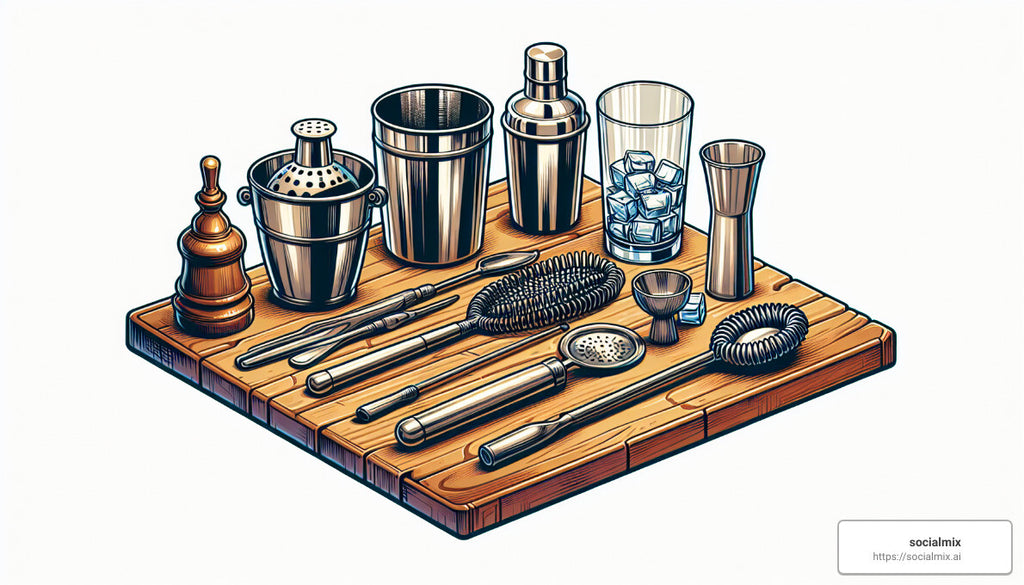
Understanding mixology means appreciating its rich history, the pioneering work of Jerry Thomas, and its connection to the culinary arts. It's about more than just making drinks; it's about creating an experience that engages all the senses.
Next, we'll explore the essential tools every mixologist needs to craft these memorable experiences.
Essential Tools for Mixologists
To be a good mixologist, you need the right tools. Think of these as your essential toolkit. Here’s a breakdown of the must-have items:
Cocktail Shaker
A cocktail shaker is essential for mixing ingredients and chilling drinks. The two main types are the Boston shaker and the Cobbler shaker.
- Boston Shaker: Consists of two cups (one metal, one glass) that fit together. It's versatile and commonly used.
- Cobbler Shaker: A three-piece shaker with a built-in strainer and cap. It's easier for beginners but can be harder to open after shaking.
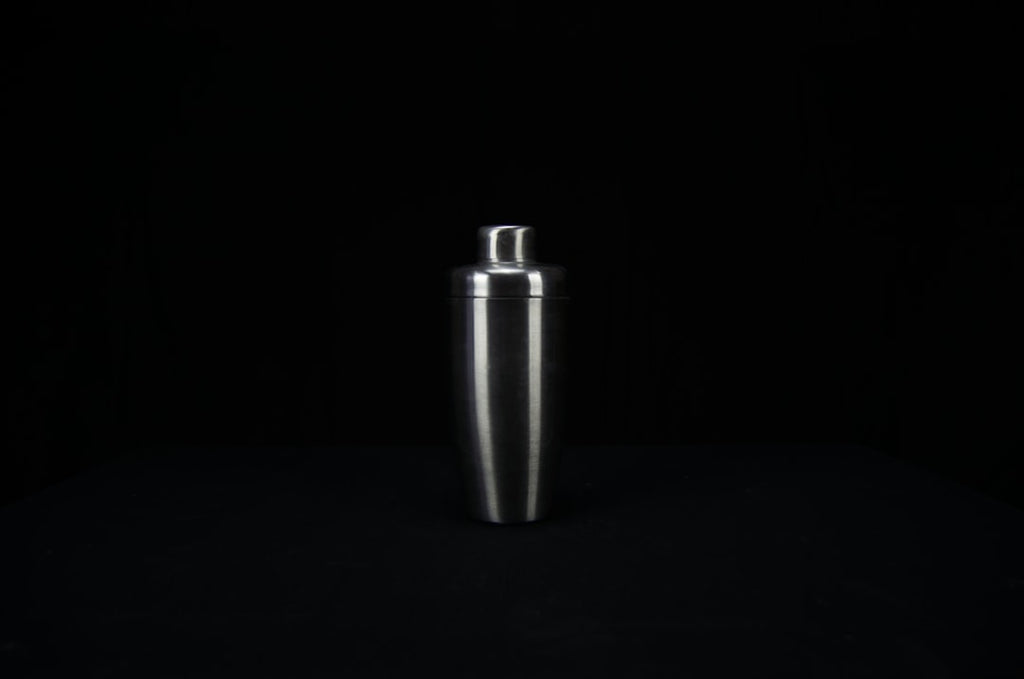
Jigger
Precision is key in mixology. A jigger ensures you measure the exact amounts of each ingredient. They come in various sizes, typically with two different measurements on each end.
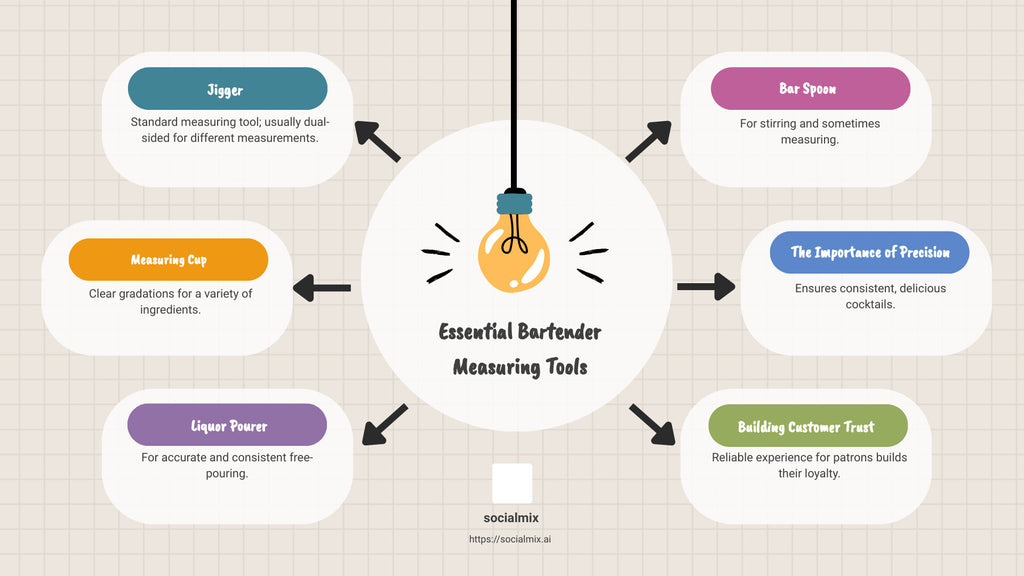
Bar Spoon
A bar spoon is perfect for stirring cocktails that need a delicate touch. It’s long and slender, making it easy to reach the bottom of tall glasses.
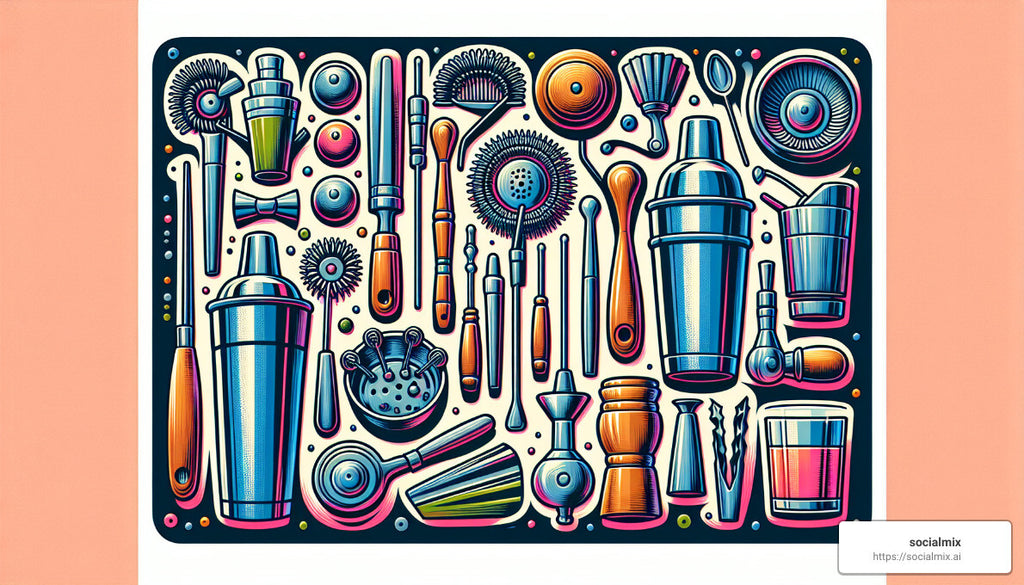
Hawthorne Strainer
After shaking or stirring, you don't want to serve the same ice. A Hawthorne strainer helps separate the liquid from the ice and other solid ingredients. It has a metal spring around the edge to catch the ice.
Muddler
A muddler is used for mashing fruits, herbs, or spices to release their flavors into the drink. Think of it like a pestle for cocktails.
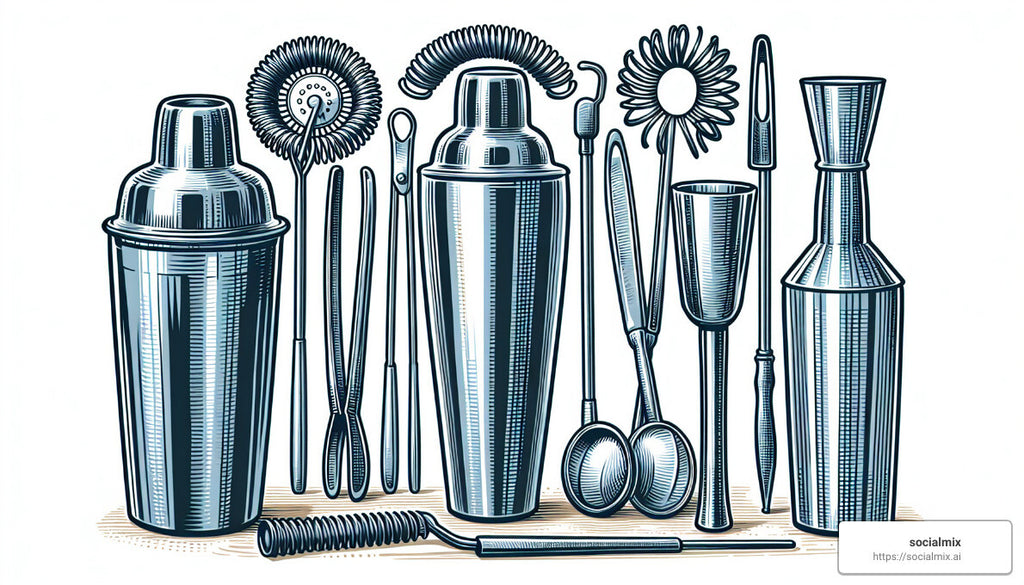
Juicer
Freshly squeezed juice makes a world of difference. A juicer helps you extract juice from citrus fruits efficiently. Handheld juicers are great for small quantities, while electric juicers are better for larger batches.

Blender
For frozen cocktails, a blender is a must. It helps you achieve the right texture and consistency, especially for drinks like margaritas and daiquiris.
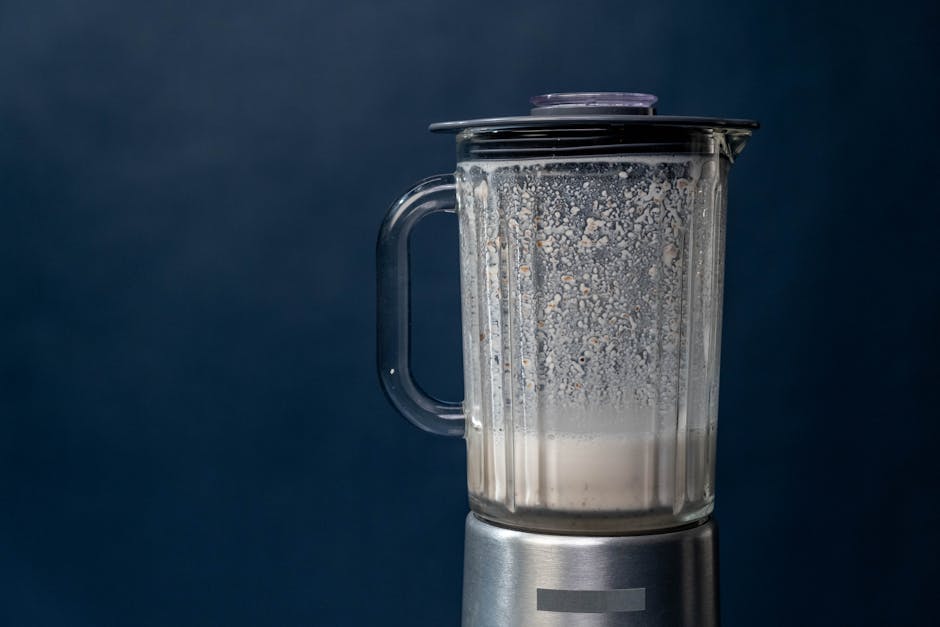
Citrus Peeler
A citrus peeler is used to create garnishes that add both flavor and visual appeal. It helps you peel the zest without getting the bitter pith.
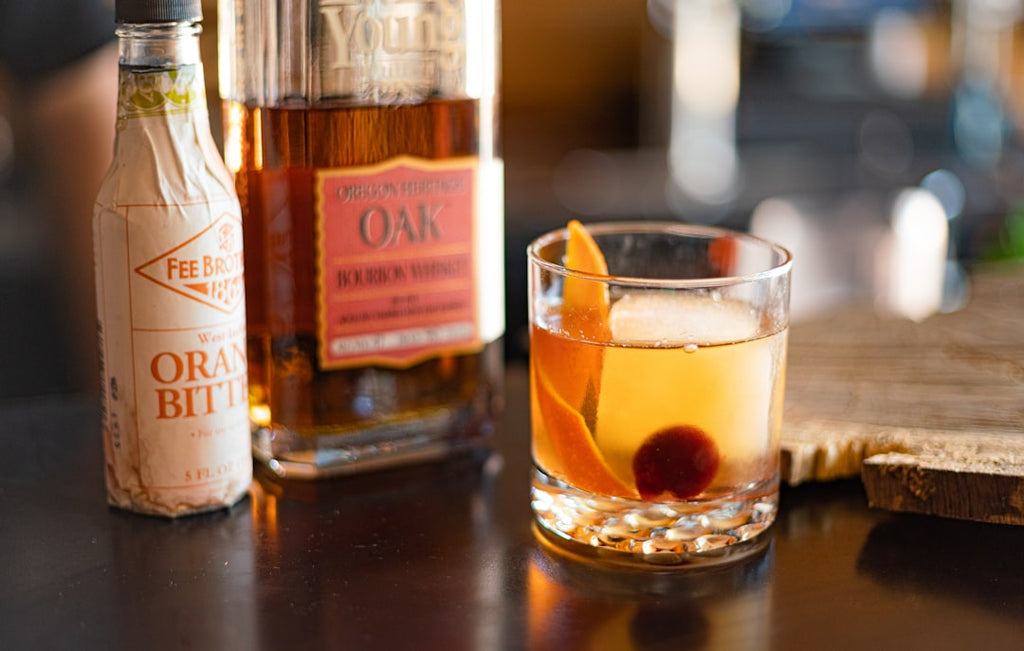
Ice Tools
Ice is crucial in cocktails, and having the right ice tools can make a big difference. This includes:
- Ice Tongs: For handling ice.
- Ice Molds: To create different shapes and sizes.
- Ice Scoop: For scooping ice into shakers or glasses.
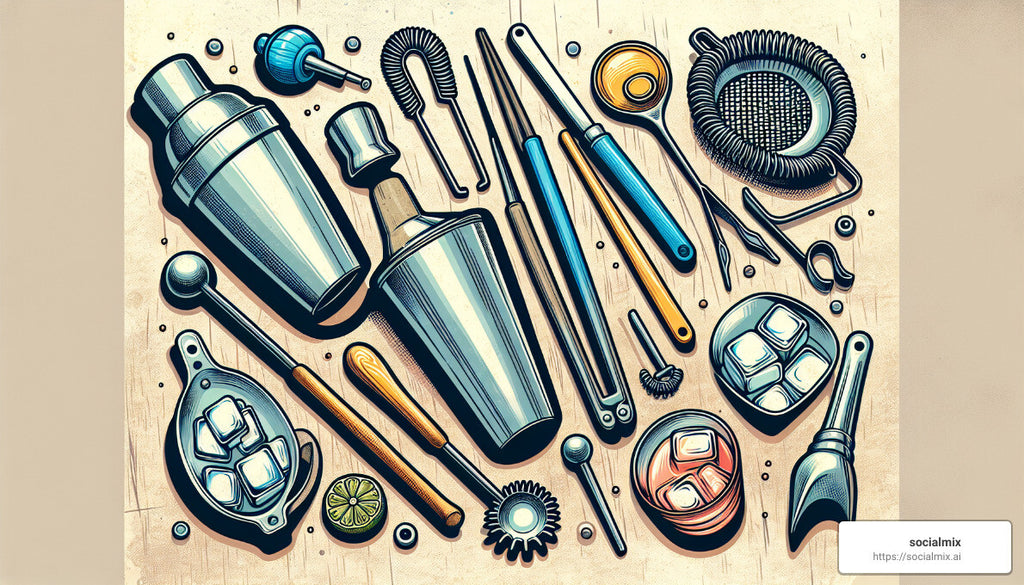
Glassware
Different cocktails require different glassware. Having a variety of glasses is important for presentation and taste. Some essentials include:
- Tumblers: For simple mixed drinks.
- Shot Glasses: For measuring and serving shots.
- Cocktail Glasses: For martinis and other mixed drinks.
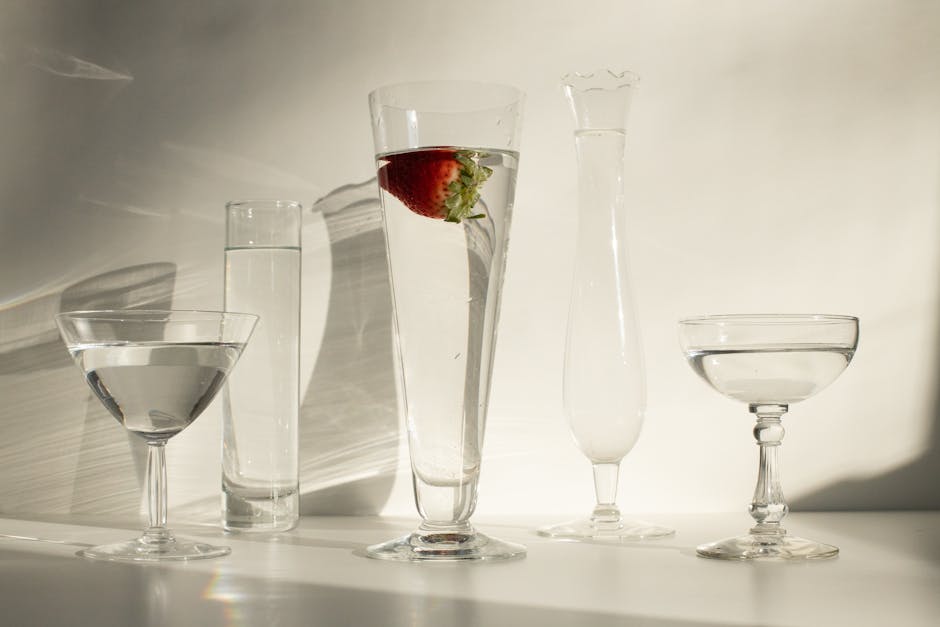
Having these tools will set you up for success and help you craft memorable cocktails. Next, we'll dive into how to be a good mixologist, focusing on the skills and knowledge you need to lift your craft.
How to Be a Good Mixologist
Educate Yourself
To be a good mixologist, you need to start with education. Knowing your ingredients and techniques is key.
Books and Online Videos: Start with some highly recommended resources. The Bar Book by Jeffrey Morgenthaler and Liquid Intelligence by Dave Arnold are must-reads. These books break down complex techniques into simple steps.
Online Videos: Platforms like YouTube have tutorials from experts. Dimitrios Zahariadis suggests watching technique videos to master the basics.
Classic Cocktails: Learn how to make classic cocktails like the Martini, Margarita, and Old Fashioned. These drinks are the foundation of mixology.
Practice Techniques
Perfecting your techniques is crucial. Here are some key skills:
Shaking: Use plenty of ice and shake hard. Harry Craddock said, "Wake it up, not rock it to sleep."
Stirring: Stir clear cocktails like Manhattans to avoid foam.
Muddling: Use a muddler to press ingredients against the glass. This releases flavors from herbs and fruits.
Free Pouring: Practice pouring without a jigger. Aim to get the pour right every time.
Rimming Glassware: Use a plate for rimming with salt or sugar to avoid unbalanced cocktails.
Mise en Place
Mise en place means "putting in place." Prepare everything you need before you start mixing.
Organization: Keep your workspace clean and organized. Arrange your tools and ingredients for easy access.
Syrups and Infusions: Make your own syrups. Infuse them with herbs, fruits, or spices for unique flavors. This not only saves money but also adds a personal touch to your drinks.
Garnishes: Prepare garnishes like citrus twists or fresh herbs in advance. They add the final touch to your cocktails.
Use Quality Ingredients
Quality ingredients make a huge difference in your cocktails.
Fresh Fruits and Herbs: Always use fresh fruits like citrus and berries. Fresh herbs like mint and basil add vibrant flavors.
Local Ingredients: Source local ingredients when possible. They are fresher and add a unique touch to your drinks.
Homemade Syrups: Homemade simple syrup is easy to make and lasts about a week. Infuse it with flavors like ginger or pineapple.
Bitters: Bitters add complexity to cocktails. They are a mix of herbs, spices, and alcohol. A few drops can transform a drink.
By focusing on these areas, you'll be well on your way to mastering the art of mixology. Next, we'll explore some advanced mixology tips to take your skills even further.
Advanced Mixology Tips
Ready to take your mixology skills to the next level? Here are some advanced tips to help you stand out and create memorable drinks.
Batching Drinks
Batching drinks can save you time, especially during busy hours. Instead of making each cocktail individually, prepare a large batch of the mix and store it in a bottle. This way, you can quickly pour and serve without compromising quality.
Pro Tip: Some state laws might restrict batching. If you can’t batch the alcohol, batch the mixers instead. For example, mix all the non-alcoholic components in a quart container. When you need to serve, just add the alcohol.
Using a Misto Spray Bottle
A Misto spray bottle can be a game-changer. Instead of pouring a small amount of spirit to coat a glass, use the spray bottle. It’s quicker and reduces waste.
Bob Peters, head mixologist at The Punch Room, says, “Spraying vermouth or absinthe into a glass in front of your guests really piques their interest and can start a dialog that will make for a unique experience.”
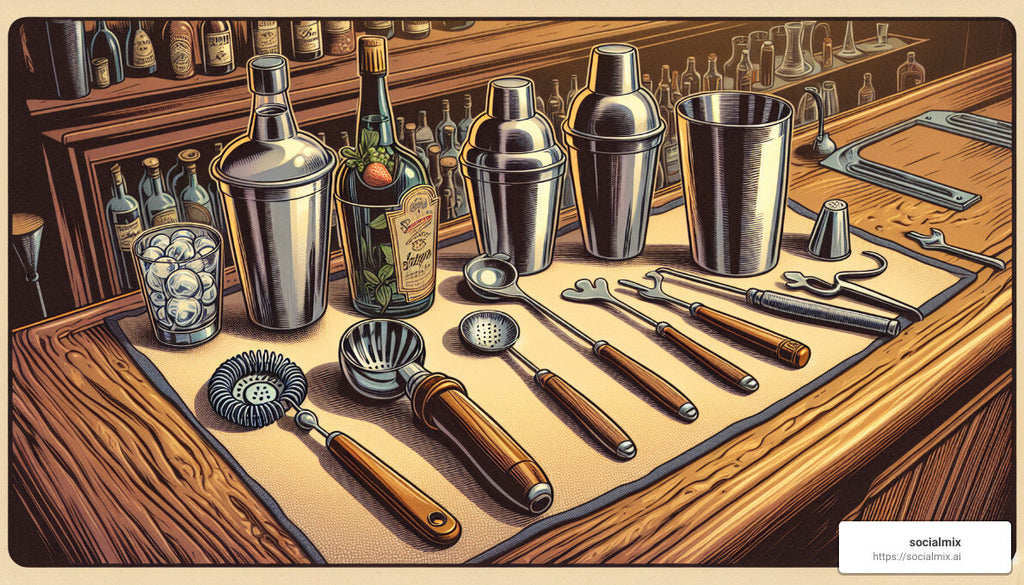
Developing New Recipes
Creating new cocktail recipes is both an art and a science. Spend hours developing and testing new drinks, refining them until they’re perfect.
Anna Parker of Celentano's in Glasgow recommends making your own liqueurs and even non-alcoholic versions. This allows for unique and experimental flavor combinations that can cater to all guests.
Experimenting with Flavors
Experimentation is at the heart of mixology. Try out unusual ingredient combinations and techniques like sous-vide infusions or smoking.
Maroš Dzurus from Himkok says, “Molecular mixology, introducing elements like foams and gels, has added a new dimension to cocktail experiences.”
However, you don’t always need fancy equipment. Start with simple techniques like making shrubs and cordials. The key is to understand how different flavors work together to create a harmonious drink.
By incorporating these advanced tips, you can lift your mixology game and impress your guests with innovative and delicious cocktails.
Next, we’ll answer some frequently asked questions about how to be a good mixologist.
Frequently Asked Questions about How to Be a Good Mixologist
What is the difference between a bartender and a mixologist?
A bartender serves drinks and manages the bar. They ensure customers have a good time and handle the logistics of running a bar.
A mixologist, on the other hand, focuses on the art and science of crafting cocktails. They experiment with flavors, create new drinks, and often have a deep understanding of ingredients and techniques. Think of a mixologist as a specialized bartender with a creative flair.
What are the six basic liquors every mixologist should know?
To be a good mixologist, you need to know these six basic liquors:
- Vodka - Neutral and versatile, great for many cocktails.
- Gin - Known for its juniper flavor, essential in classics like the Martini.
- Rum - Comes in light and dark varieties, perfect for tropical drinks.
- Tequila - Key for margaritas and other vibrant cocktails.
- Whiskey - Includes bourbon, rye, and scotch, used in many classic drinks.
- Brandy - Distilled from wine, used in cocktails like the Sidecar.
How can I practice mixology at home?
Practicing mixology at home is easy and fun. Here’s how to get started:
-
Get the Right Tools: Invest in a basic mixology kit with a shaker, jigger, strainer, muddler, and bar spoon. Read more about essential tools.
-
Educate Yourself: Read books like The Bar Book by Jeffrey Morgenthaler or Liquid Intelligence by Dave Arnold. Watch online videos and follow expert mixologists.
-
Start Simple: Begin with classic cocktails like the Old Fashioned, Martini, or Daiquiri. Experiment with different recipes and find what you like.
-
Use Quality Ingredients: Fresh fruits, herbs, and homemade syrups make a big difference. Avoid pre-made mixes and opt for fresh juices.
-
Practice Techniques: Focus on shaking, stirring, muddling, and rimming glassware. Each technique affects the drink's flavor and presentation.
-
Stay Organized: Keep your workspace clean and organized. Prepare your ingredients before you start mixing (mise en place).
By following these steps, you’ll develop your skills and become a confident mixologist at home.
Conclusion
At socialmix, we believe that crafting cocktails is more than just mixing drinks; it's about creating memorable experiences. Whether you're a seasoned mixologist or just starting, embracing cocktail culture can lift any social gathering.
Cocktail Culture
Cocktail culture is all about the art and science of creating drinks that tell a story. Each cocktail combines flavors, aromas, and presentation to create a unique experience. As mixologists, we have the opportunity to share our creativity and passion with others, making each drink a memorable part of someone's evening.
Bartending Expertise
A great bartender or mixologist not only serves drinks but also improves the atmosphere. Engaging with guests, explaining ingredients, and demonstrating techniques can transform a simple night out into an unforgettable event. As Natalie Bovis aptly puts it, "Drinks are second to service."
Memorable Experiences
Crafting cocktails is about more than just the beverages. It's about the laughter, conversations, and connections that happen over a well-made drink. At socialmix, we encourage you to take these lessons and tips to host your own craft cocktail night. Invite friends, plan a menu, and create an atmosphere that fosters unforgettable moments.
Every cocktail you make is a reflection of your creativity and passion. Don't be afraid to experiment and make mistakes. Each step brings you closer to mastering the art of mixology.
For more tips and to explore our services, visit socialmix. Cheers to your next unforgettable cocktail experience!





Leave a comment